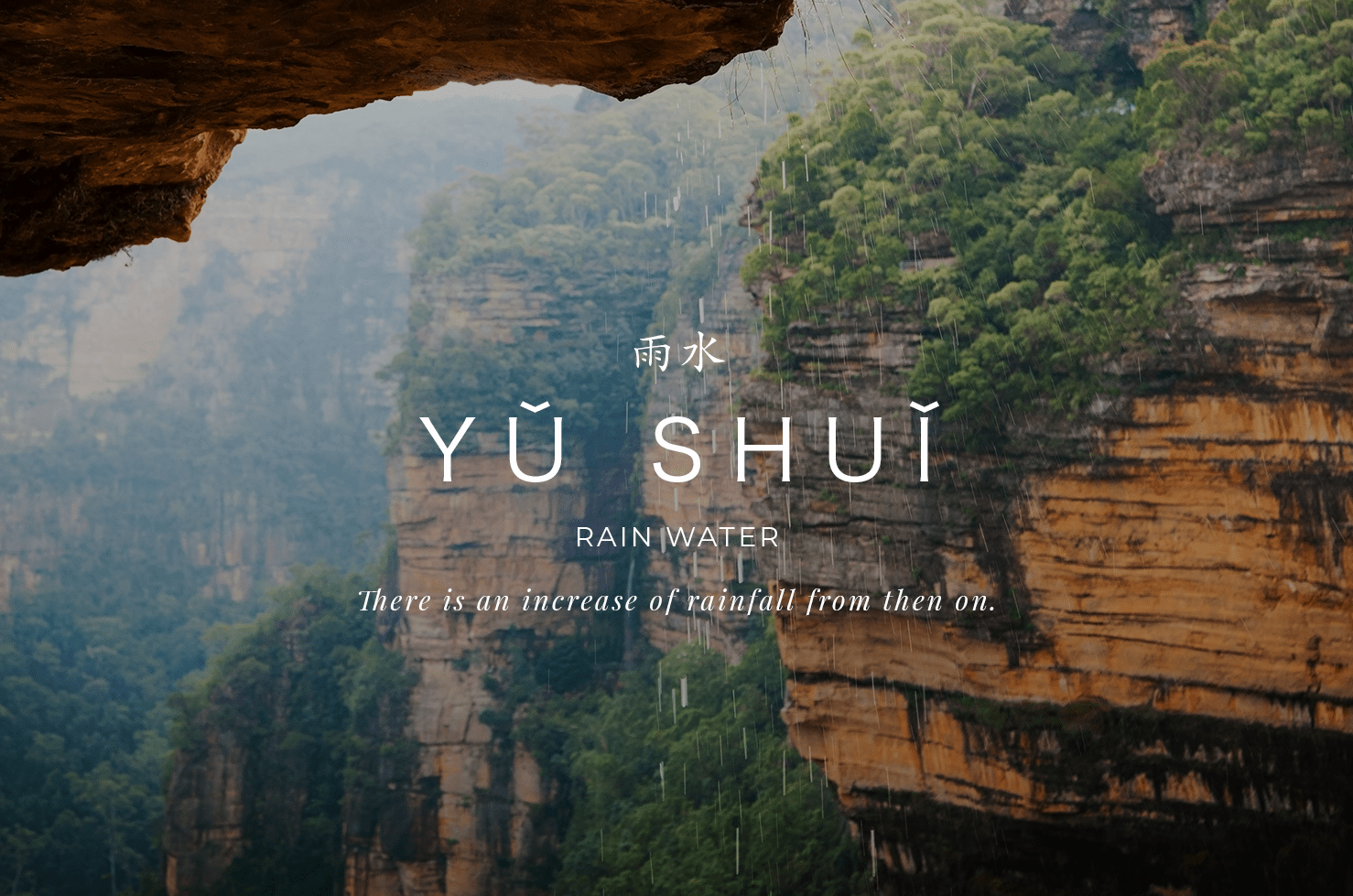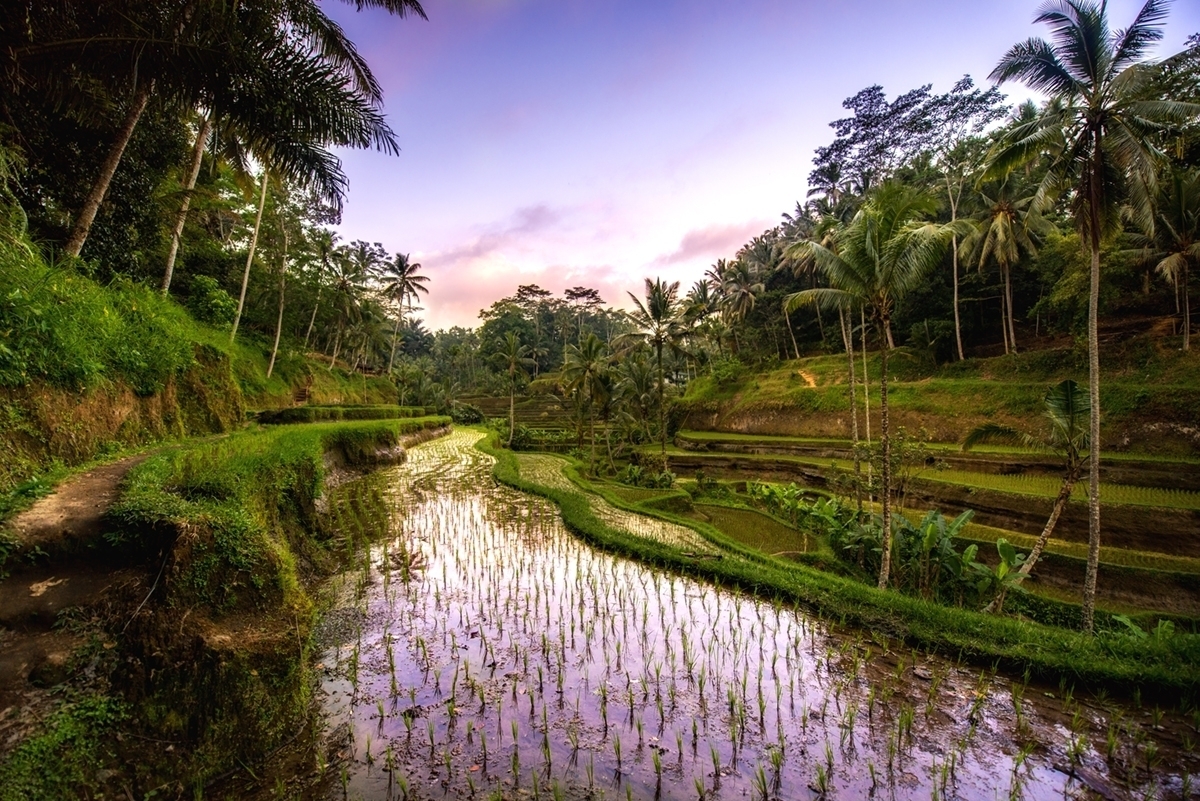Yǔ Shuǐ: Rain Water
雨水 Yǔ Shuǐ: Rain Water
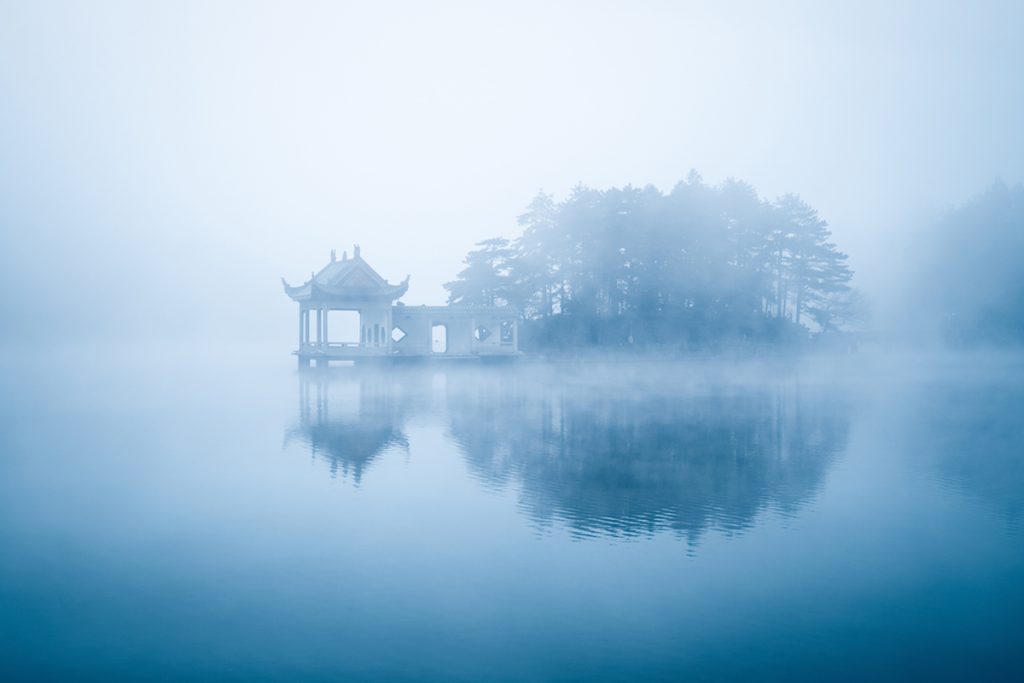
February 19th through March 4th marks the time of 雨水 Yǔ Shuǐ, translated as Rain Water, the 2nd term in the Ancient Chinese solar calendar. 雨水 Yǔ Shuǐ is also the 2nd term of the spring season. Increased rainfall and a rise in temperatures typically occurs during this time of the year. The ice on the rivers and lakes will start to thaw; wild geese will begin their journey back north, and flora and fauna will commence their awakening.
雨水 Yǔ Shuǐ 3 pentads:
1st pentad – 獺祭魚 otters make offerings of fish
2nd pentad – 鴻雁來 the wild geese arrive
3rd pentad – 草木萌動 trees and grass put forth shoots
Rain Water begins when the Sun reaches the celestial longitude of 330° and ends when it reaches the longitude of 345°. This solar term is known for its decreasing snowfall and increasing rainfall. The Ancient Chinese considered rainfall in spring as precious as oil. In northern China for example, spring drought is common and farmers are in dire need of moisture while they are preparing the soil for cultivation and fertilization.
Rain during the spring time is as precious as oil – Ancient Chinese Proverb
Although there will be a decrease in snowfall and an increase in temperatures, this does not mean that the cold weather is done in the Northern Hemisphere. A winter chill still lingers in the air and the Rain Water solar term is known for the occasional return of cold spells. That is why it is highly recommended not to part with your winter clothing just yet. The Ancients emphasized exercising great care during this time.
Return to Mother’s House During 雨水 Yǔ Shuǐ: Rain Water
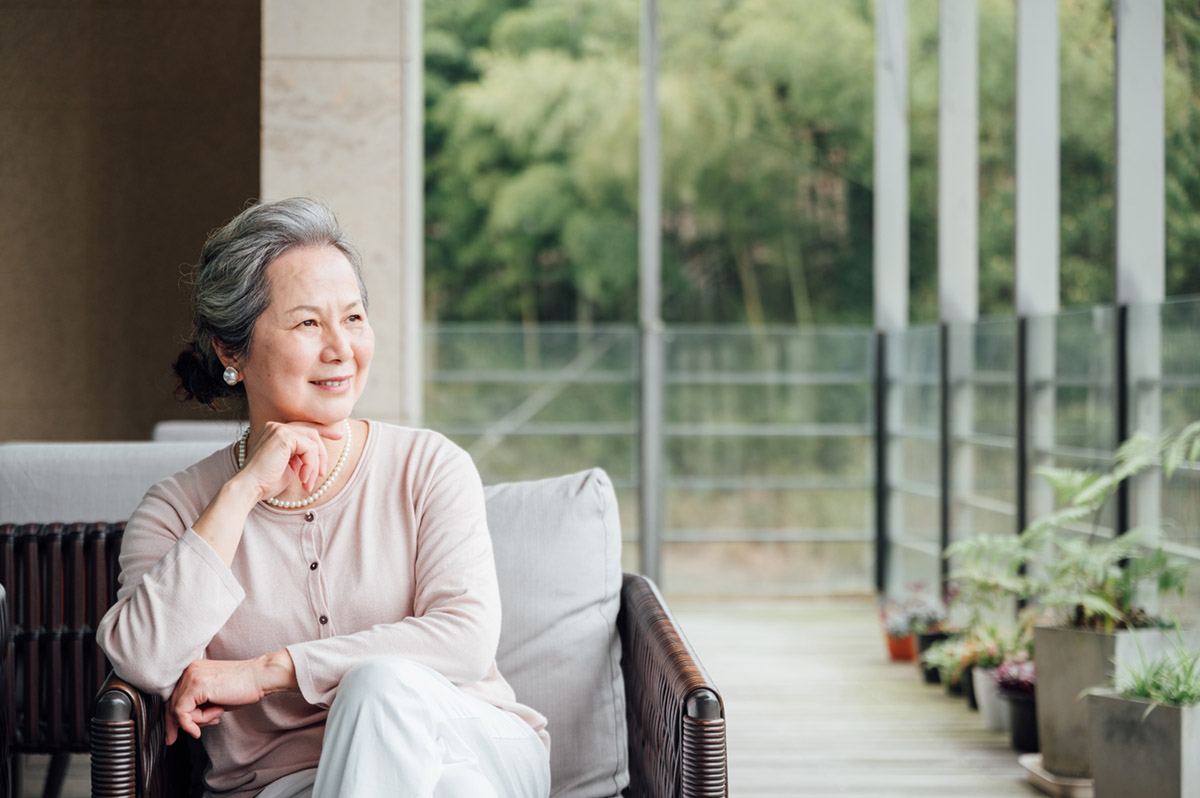
One of the Ancient Chinese traditions still followed today is “return to mother’s house” during the Rain Water solar term. Married women are expected to visit their parental home and bring their husband and kids with them. The younger generation traditionally brings cooked food and 2 bamboo chairs to present to their parents. The word 椅 Yǐ (chair) symbolizes reliance in the Chinese language. The gift of 2 bamboo chairs signifies reliance of the older generation on the younger generation.
雨水 Yǔ Shuǐ & Bamboo
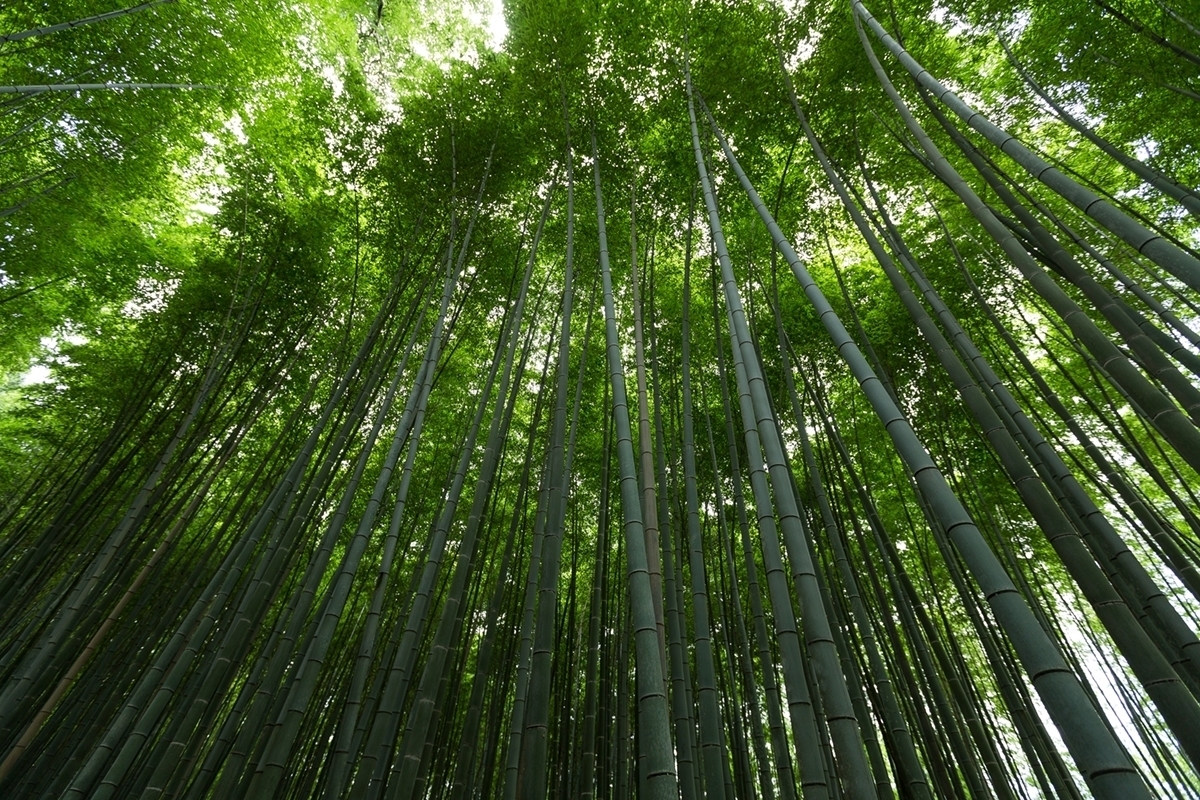
China is known as the Kingdom of Bamboo. This tree is rooted in Chinese culture and it symbolizes traditional Chinese values. Ancient Chinese called the plum tree, orchid, bamboo and chrysanthemum the “Four Gentlemen”, and the pine, bamboo and plum tree the “Three Friends of Winter”.
Bamboo’s deep roots symbolize resoluteness, its tall stem – honor and its hollow interior – modesty.
Bamboo in front of the gate, prosperity for thousands of years – ancient Chinese saying
竹笋Zhusun, or bamboo shoots are considered “king” of spring foods and Chinese people have eaten them for at least 3,000 years. It is believed that Emperor Taizong of the Tang Dynasty (618 – 907) treated his officials with a bamboo shoot banquet each spring. People are not the only species that love eating bamboo shoots, however. Pandas consume large amounts of this delicious vegetable in the spring time.
The Rain Water solar term is the period when bamboo shoots sprout and are harvested. This vegetable cooked in a variety of ways is a highly popular dish among Chinese people during this time of year.
“Spring bamboo shoots up after the rain.”
– Ancient Chinese saying
贊寧Zan Ning, a monk and scholar from the Song Dynasty, listed 98 varieties of bamboo shoots in his Book of Bamboo Shoots.
“Fresh and fragrant bamboo shoots are valued more than gold on Yuling’s markets.”
– poet義山Li Shangyin from the Tang Dynasty
Irrigation
“Good rain knows the season when spring is here.”
– Ancient Chinese Proverb
The Rain Water solar term is considered a key period for irrigation. However, the increased rainfall and melting snow can also cause flooding and bring hardship to farmers if not regulated and managed properly.
Dujiangyan Irrigation System in Southern China excels in that. It controls the waters of the Minjiang River and distributes it to over 1,652,394 acres of fertile farmland in complete harmony with nature.
This engineering marvel was constructed in the 3rd century B.C. and still functions perfectly today. The system utilizes natural topographical and hydrological features. It brought an end to flooding in the area after its construction and turned Sichuan into a thriving agricultural region of China.
In 2000 Dujiangyan became a UNESCO World Heritage Site. It is believed that Dujiangyan Irrigation System is the world’s oldest irrigation system and the only surviving non-dam irrigation system from the ancient past.
“Good rain knows its time right
It will fall when comes spring
With wind it steals in night
Mute, it moistens each thing
Happy Rain in Spring.”-by the poet 杜甫 Du Fu from the Tang Dynasty
元宵節 Lantern Festival
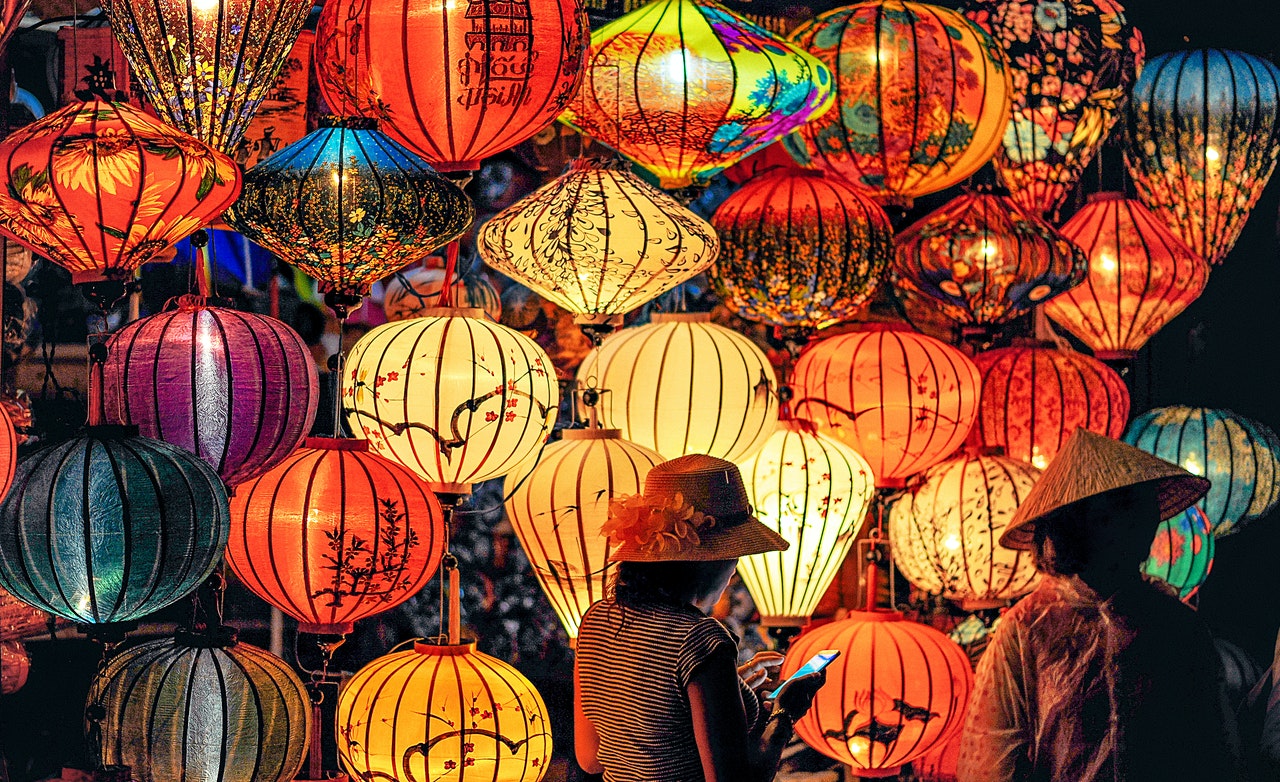
元宵節 Yuánxiāo Jié, the Lantern Festival, marks the final day of the Chinese New Year and Spring Festival celebrations. This happens right around the 雨水 Yǔ Shuǐ Rain Water solar term. It is the oldest Chinese festival and dates back to at least the Western Han Dynasty (206 B.C. – 25 A.D.).
The 元宵節 Lantern Festival gained its popularity during the Tang (618-907) and Song (960-1279) Dynasties. Celebrations lasted for several days and included lantern shows, dragon and lion dances, folk performances and fireworks. In ancient China, the lanterns were used to provide light as well as to signify a peaceful life.
The lanterns are a sea of many shapes, sizes and colors, each color having a different meaning. For instance, the red paper lanterns symbolize wealth, fame, and prosperity. They are used to celebrate “joy and harmony, such as weddings, opening a business, family reunions, as well as the celebration of some festivals.”
“One night’s east wind adorns a thousand trees with flowers
and blows down stars in showers.
Fine steeds and carved cabs spread fragrance en route;
Music vibrates from the flute;
The moon sheds its full light while fish and dragon lanterns dance all night.
In gold-thread dress, with moth or willow ornaments,
Giggling, she melts into the throng with trails of scents.
But in the crowd once and again,
I look for her in vain. When all at once I turn my head,
I find her there where lantern light is dimly shed.”-by Xin Qiji during Song Chunxi (1174-1189), translated by Xu Yuanchong
Additional Resources
Looking for more information on this time of the year? Try these resources below, and enjoy! May you continue to balance and harmonize yourself as we transition into雨水 Yǔ Shuǐ.
Don’t forget to check out the newest videos on our YouTube Channel
Jammin’ With Jiao Shi

And join us for Jammin’ with Jiao Shi, Saturday, February 19th at 4:00pm ET for ALL, 4:45pm ET for TypeMe Community Members, and 5:30pm ET on Clubhouse @ohoseminars. See you there!
February 19th through March 4th marks the time of 雨水 Yǔ Shuǐ, translated as Rain Water, the 2nd term in the Ancient Chinese solar calendar. 雨水 Yǔ Shuǐ is also the 2nd term of the spring season. Increased rainfall and a rise in temperatures typically occurs during this time of the year. The ice on the rivers and lakes will start to thaw; wild geese will begin their journey back north, and flora and fauna will commence their awakening.
雨水 Yǔ Shuǐ 3 pentads:
1st pentad – 獺祭魚 otters make offerings of fish
2nd pentad – 鴻雁來 the wild geese arrive
3rd pentad – 草木萌動 trees and grass put forth shoots
Rain Water begins when the Sun reaches the celestial longitude of 330° and ends when it reaches the longitude of 345°. This solar term is known for its decreasing snowfall and increasing rainfall. The Ancient Chinese considered rainfall in spring as precious as oil. In northern China for example, spring drought is common and farmers are in dire need of moisture while they are preparing the soil for cultivation and fertilization.
Rain during the spring time is as precious as oil – Ancient Chinese Proverb
Although there will be a decrease in snowfall and an increase in temperatures, this does not mean that the cold weather is done in the Northern Hemisphere. A winter chill still lingers in the air and the Rain Water solar term is known for the occasional return of cold spells. That is why it is highly recommended not to part with your winter clothing just yet. The Ancients emphasized exercising great care during this time.
[/vc_column_text]
Return to Mother’s House During 雨水 Yǔ Shuǐ: Rain Water

One of the Ancient Chinese traditions still followed today is “return to mother’s house” during the Rain Water solar term. Married women are expected to visit their parental home and bring their husband and kids with them. The younger generation traditionally brings cooked food and 2 bamboo chairs to present to their parents. The word 椅 Yǐ (chair) symbolizes reliance in the Chinese language. The gift of 2 bamboo chairs signifies reliance of the older generation on the younger generation.
雨水 Yǔ Shuǐ & Bamboo

China is known as the Kingdom of Bamboo. This tree is rooted in Chinese culture and it symbolizes traditional Chinese values. Ancient Chinese called the plum tree, orchid, bamboo and chrysanthemum the “Four Gentlemen”, and the pine, bamboo and plum tree the “Three Friends of Winter”.
Bamboo’s deep roots symbolize resoluteness, its tall stem – honor and its hollow interior – modesty.
Bamboo in front of the gate, prosperity for thousands of years – ancient Chinese saying
竹笋Zhusun, or bamboo shoots are considered “king” of spring foods and Chinese people have eaten them for at least 3,000 years. It is believed that Emperor Taizong of the Tang Dynasty (618 – 907) treated his officials with a bamboo shoot banquet each spring. People are not the only species that love eating bamboo shoots, however. Pandas consume large amounts of this delicious vegetable in the spring time.
The Rain Water solar term is the period when bamboo shoots sprout and are harvested. This vegetable cooked in a variety of ways is a highly popular dish among Chinese people during this time of year.
“Spring bamboo shoots up after the rain.”
– Ancient Chinese saying
贊寧Zan Ning, a monk and scholar from the Song Dynasty, listed 98 varieties of bamboo shoots in his Book of Bamboo Shoots.
“Fresh and fragrant bamboo shoots are valued more than gold on Yuling’s markets.”
– poet義山Li Shangyin from the Tang Dynasty
Irrigation
“Good rain knows the season when spring is here.”
– Ancient Chinese Proverb
The Rain Water solar term is considered a key period for irrigation. However, the increased rainfall and melting snow can also cause flooding and bring hardship to farmers if not regulated and managed properly.
Dujiangyan Irrigation System in Southern China excels in that. It controls the waters of the Minjiang River and distributes it to over 1,652,394 acres of fertile farmland in complete harmony with nature.
This engineering marvel was constructed in the 3rd century B.C. and still functions perfectly today. The system utilizes natural topographical and hydrological features. It brought an end to flooding in the area after its construction and turned Sichuan into a thriving agricultural region of China.
In 2000 Dujiangyan became a UNESCO World Heritage Site. It is believed that Dujiangyan Irrigation System is the world’s oldest irrigation system and the only surviving non-dam irrigation system from the ancient past.
“Good rain knows its time right
It will fall when comes spring
With wind it steals in night
Mute, it moistens each thing
Happy Rain in Spring.”-by the poet 杜甫 Du Fu from the Tang Dynasty
元宵節 Lantern Festival

元宵節 Yuánxiāo Jié, the Lantern Festival, marks the final day of the Chinese New Year and Spring Festival celebrations. This happens right around the 雨水 Yǔ Shuǐ Rain Water solar term. It is the oldest Chinese festival and dates back to at least the Western Han Dynasty (206 B.C. – 25 A.D.).
The 元宵節 Lantern Festival gained its popularity during the Tang (618-907) and Song (960-1279) Dynasties. Celebrations lasted for several days and included lantern shows, dragon and lion dances, folk performances and fireworks. In ancient China, the lanterns were used to provide light as well as to signify a peaceful life.
The lanterns are a sea of many shapes, sizes and colors, each color having a different meaning. For instance, the red paper lanterns symbolize wealth, fame, and prosperity. They are used to celebrate “joy and harmony, such as weddings, opening a business, family reunions, as well as the celebration of some festivals.”
“One night’s east wind adorns a thousand trees with flowers
and blows down stars in showers.
Fine steeds and carved cabs spread fragrance en route;
Music vibrates from the flute;
The moon sheds its full light while fish and dragon lanterns dance all night.
In gold-thread dress, with moth or willow ornaments,
Giggling, she melts into the throng with trails of scents.
But in the crowd once and again,
I look for her in vain. When all at once I turn my head,
I find her there where lantern light is dimly shed.”-by Xin Qiji during Song Chunxi (1174-1189), translated by Xu Yuanchong
Additional Resources
Looking for more information on this time of the year? Try these resources below, and enjoy! May you continue to balance and harmonize yourself as we transition into雨水 Yǔ Shuǐ.
Don’t forget to check out the newest videos on our YouTube Channel
Jammin’ With Jiao Shi


